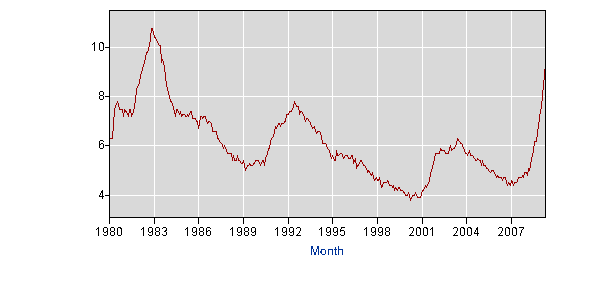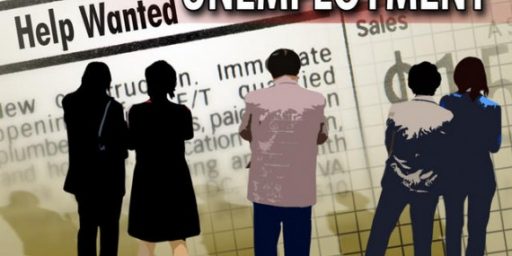Unemployment Up To 9.4%
The BLS today released its employment situation report and the bad news is that unemployment is now at 9.4%. The last time unemployment was this high was in July of 1983.
Nonfarm payroll employment fell by 345,000 in May, about half the average monthly decline for the prior 6 months, the Bureau of Labor Statistics of the U.S. Department of Labor reported today. The unemployment rate continued to rise, increasing from 8.9 to 9.4 percent. Steep job losses continued in manufacturing, while declines moderated in construction and several service-providing industries.
Going by the Household Survey the number of unemployed increased by 787,000. This makes this recession as bad as 1957 and not quite as bad as 1948 in terms of unemployment. So despite the very mild good news yesterday about new jobless claims this data more than offsets it.






It is well that new jobless claims are going down but I have all kinds of anecdotal evidence from personal experience that companies aren’t hiring and are delaying or deferring a lot of things we were talking about them doing during this fiscal year.
Is there a handy weekly “net new jobs” number that would be more relevant for these discussions?
No there isn’t. I wouldn’t be surprised that new jobless claims slows before the unemployment rate starts to decline. After all, a firm that is seeing business starting to turn around is more likely to retain workers than to rush out and hire new ones. I don’t know if anyone has looked at it rigorously though.
We better hope this is a bottom and not a pause.
Well, Obama’s people have been trying to sell us on the idea of how many jobs they’ve saved with the massive spending they’ve been doing. And it certainly sound reasonable until you consider that there is no accepted means of measuring that.
Prediction: This will be spun as proof that Obamanomics has allowed more americans than ever to not be forced to labor – what a leader.
I suppose the real kicker here is that the unemployment rate is much worse than if the Stimulus Package had not passed — according to the Obama Administration.
In that respect, it’s not unlike the claims of how many lives were saved by the war on terror. While both are an acceptable justifications for action, neither is acceptable evidence for that action’s success.
It’s also worse that if the Stimulus Package had passed, according the the quoted article. There is no reason to believe that their estimates without the stimulus would have been any more accurate.
Again, an acceptable reason for action, not a acceptable evidence for success (or failure).
Michael, my point is that the unemployment estimates coming out of the Obama administration with or without the Stimulus Package are completely made up and lacking in any credibility whatsoever. Why, it’s as if the Stimulus Package really isn’t about the economy at all. Now, about those even more complex gloabal warming models, … but I digress.
I’ve read a few things here and there about the Obama administration being big on perception being reality. Sometimes, this is sort of true, except, of course, when it isn’t. Reality always wins in the end.
Those of you who say it is hard to calculate the impact of the stimulus (and the simultaneous expansion of the Fed balance sheet) are correct.
Just the same, it’s hard to make a case that they made things worse, or that they were over-kill for a “typical” recession.
We certainly didn’t get the mild “no problem, no worries” recession some predicted back in December.
We now know it is “as bad as 1957 and not quite as bad as 1948 in terms of unemployment” and that it isn’t over.
Nice straw man, odo. “No problem, no worries?”
The basic issue has been: is it the Great Depression II, a severe 1957/8, 1974/5 or 1981/2 style recession……..or 1991 or 2001 style.
I’m not impressed that anyone here or on a number of sites I’ve visited haven’t acknowledged its in the 1981 et al class. That’s not “no worries.” But it was Obama who invoked The Great Depression – for crass political reasons – who disgraced himself. (It was horribly irresponsible in a money run to invoke what he did. Pure rookie crap. I’m not surprised.) Not commentators. Obama missed by a country mile.
It seems to me that the elephant in the room isn’t whether its GDII, but what are the prospects for material recovery? And on this, the Obama Administration seems to be following the Japanese policy path. And we know how that went.
I feel a polemic coming on. So I’ll try to stuff it and be short. The US economy has benefitted from a massive credit bubble, clearly traceable from the mid 90’s as evidenced by equity and housing asset bubbles. (Sorry, Bill.) Others may quibble about timing. But at the end of the day, sustainable long term GDP growth is about population growth, demographic trends, productivity/technological advancement and entrepreneurship free from government interference.
Unfortunately – in an environment where demographics are problematic and assets values have deflated – we now have a President who is about quasi-socialist ideals like spread the wealth, bigger government and entitlements and tax the risk takers. Not to mention screw well worn business practices like the primacy of secured liens. That’s chilling, and I can’t imagine business people who are dying to put out risk capital in this uncertain environment. I’m not. Wrong man at the wrong time.
The biggest losers will be the little guy. And that’s why I have no use for this man.
Sure, “no problem, no worries, wait for the natural recover that was right around the corner.”
I see about half truth in those paragraphs, wrapped in a wicked ideological filter. I mean, we got the Mozilo indictment yesterday, and today you can say “entrepreneurship free from government interference”
A moderate would not choose today to talk about that. The power of one big crook to bring down much more than himself is a little to recent in our minds.
It is probably the wrong week to put forth the assertion that markets are safely self-regulating.
As if the unemployment itself weren’t bad enough, what’s equally concerning to me is the phlegmatic growth in employment in the last several recoveries. Unless something changes this time around those who find themselves unemployed are rather likely to stay that way for the foreseeable future.
That’s why I keep railing over at my place about companies exploiting the downturn to improve the bottom line which is absolutely true of a lot of the companies who’ve laid people off. Laying people off when that’s what you’ve got to do to survive is one thing. IMO laying them off when you’re still making money and paying dividends is something entirely different.
I haven’t been here in months. I just stopped by because I was looking at Intrade, where they’re giving 71% odds that unemployment will be over 10.0% in December, and I recalled that months ago here people were saying that the economy wasn’t that bad and Obama was just talking it down and some conservative said (paraphrasing) “It’s not so bad. I mean is anybody even Talking about unemployment getting to 10%????”